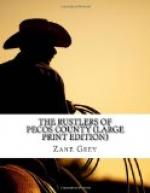I understood. And I pitied her and hated myself and marveled at this thing, love. It made another woman out of Diane Sampson. I could scarcely comprehend that she was asking me, almost beseechingly, for further assurance of Steele’s love. I knew nothing of women, but this seemed strange. Then a thought sent the blood chilling back to my heart. Had Diane Sampson guessed the guilt of her father? Was it more for his sake than for her own that she hoped—for surely she hoped—that Steele loved her?
Here was more mystery, more food for reflection. Only a powerful motive or a self-leveling love could have made a woman of Diane Sampson’s pride ask such a question. Whatever her reason, I determined to assure her, once and forever, what I knew to be true. Accordingly, I told her in unforgettable words, with my own regard for her and love for Sally filling my voice with emotion, how I could see that Steele loved her, how madly he was destined to love her, how terribly hard that was going to make his work in Linrock.
There was a stillness about her then, a light on her face, which brought to my mind thought of Sally when I had asked her to marry me.
“Russ, I beg you—bring us together,” said Miss Sampson. “Bring about a meeting. You are my friend.” Then she went swiftly away through the flowers, leaving me there, thrilled to my soul at her betrayal of herself, ready to die in her service, yet cursing the fatal day Vaughn Steele had chosen me for his comrade in this tragic game.
That evening in the girls’ sitting-room, where they invited me, I was led into a discourse upon the gun-fighters, outlaws, desperadoes, and bad men of the frontier. Miss Sampson and Sally had been, before their arrival in Texas, as ignorant of such characters as any girls in the North or East. They were now peculiarly interested, fascinated, and at the same time repelled.
Miss Sampson must have placed the Rangers in one of those classes, somewhat as Governor Smith had, and her father, too. Sally thought she was in love with a cowboy whom she had been led to believe had as bad a record as any. They were certainly a most persuasive and appreciative audience. So as it was in regard to horses, if I knew any subject well, it was this one of dangerous and bad men. Texas, and the whole developing Southwest, was full of such characters. It was a very difficult thing to distinguish between fighters who were bad men and fighters who were good men. However, it was no difficult thing for one of my calling to tell the difference between a real bad man and the imitation “four-flush.”
Then I told the girls the story of Buck Duane, famous outlaw and Ranger. And I narrated the histories of Murrell, most terrible of blood-spillers ever known to Texas; of Hardin, whose long career of crime ended in the main street in Huntsville when he faced Buck Duane; of Sandobal, the Mexican terror; of Cheseldine, Bland, Alloway, and other outlaws of the Rio Grande; of King Fisher and Thompson and Sterrett, all still living and still busy adding notches to their guns.




